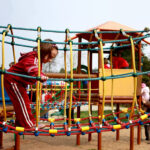National Playground Safety Week is observed annually on the last week of April. This year it will be held from April 20 to 23 as it highlights the importance of responsible play. A playground is a place, usually outdoors, specially built to give kids a space to have fun together with other children in the neighborhood. Recreation areas can also be enjoyed by adults however the equipment is more for fitness purposes. Playgrounds come with hazards and risks so it’s important to consider safety which is why National Program for Playground Safety (NPPS) established National Playground Safety Week as a time to focus on children’s outdoor play environments, and show gratitude for those who effectively maintain playgrounds.
History of National Playground Safety Week
The history of playgrounds goes back to the 19th Century when developmental psychologists like Friedrich Fröbel came up with the idea of a recreational area as a developmental tool that instills children with a sense of fair play and good manners. Playgrounds in Germany were built for childhood development, but the first purpose-built recreational area open to the public was in Manchester, England in 1859. In the 20th Century, as more vehicles rode the streets it wasn’t safe for children to play in the lanes near their homes anymore. Thus, designated play areas were built to protect kids from the dangers of the road and into secured areas instead.
The Outdoor Recreation League funded the building of playgrounds on parkland after newspaper reports indicated the high number of children run down by cars in New York. One of the first recreational areas in America was built in San Francisco’s Golden Gate Park in 1887.
In post-war London, Lady Allen of Hurtwood brought in and made famous the concept of the ’junk playground.’ In a junk playground, the equipment is constructed from recycled material and rubble. Lady Allen campaigned to build facilities for kids living in the new high-rise developments in Britain’s cities. She also penned a series of illustrated books on the subject of playgrounds and at least one book on spaces for free creativity by children. Today, after many years of research and individual testimonies we have seen how playgrounds provide educational value and enhanced physical health.
National Playground Safety Week timeline
The first public-access recreational area is opened in Manchester, England.
One of the first playgrounds in America is built in San Francisco's Golden Gate Park.
The slide is invented by Charles Wicksteed in 1922.
National Program for Playground Safety (NPPS) makes National Playground Safety Week official.
National Playground Safety Week FAQs
Why do you need to have a playground safety checklist?
To safeguard the outdoor play area and reduce potential accidents and injuries.
At what age can a child swing themselves?
Children should be comfortable swinging themselves by the age of five. At that age, they should have the coordination to balance themselves on a swing.
Can a four-year-old do monkey bars?
Children from the ages of five and up can climb with little guidance while younger children between three and four may not have developed the necessary motor skills and need more assistance.
How to Observe National Playground Safety Week
Thank a worker
Take the time to show gratitude towards those who maintain playgrounds so that the environment is safe for children to play in. You could show your appreciation by giving a donation or voucher.
Complete playground equipment safety checks
Inspect the equipment in your local playground in your personal capacity. Raise any concerns you may have with the park’s manager or recommend any safety upgrades that come to mind.
Be heard
If your concerns aren’t being taken seriously, see if you can get the support of fellow community members. Reaching out to the media is another option available to you if you’re trying to prevent the injury of a child.
5 Amazing Facts About Play-Time
It improves children’s physical ability
Playgrounds allow the children to play and it improves their balance and coordination.
It helps develop speech
The opportunity that kids have to interact with others in the playground enhances speech development and communication skills.
Playgrounds build children’s patience
Spending time on a playground teaches children to wait their turn without complaining, an important life skill.
It helps kids overcome challenges
Playgrounds teach children how to problem-solve.
Orderly Chaos
Research reveals that children with the freedom to play, grow to become happier and well-adjusted adults.
Why National Playground Safety Week is Important
It supports childhood development
National Playground Safety Week recognizes the need to secure the space in which children learn lifelong skills. It makes it easy to lobby for the infrastructure that we need.
It builds children's literacy and numeracy skills
Playground equipment used by nursery and preschool children has been found to improve their basic language and maths skills. The equipment also assists in building a child's creativity and imagination.
It prevents cognitive health problems
Researchers agree that physical activity reduces the risk of psychological issues in kids and builds their self-esteem. It is like a balm to the weary soul.
National Playground Safety Week dates
| Year | Date | Day |
|---|---|---|
| 2024 | April 22–25 | Monday–Thursday |
| 2025 | April 21–24 | Monday–Thursday |
| 2026 | April 20–23 | Monday–Thursday |

























